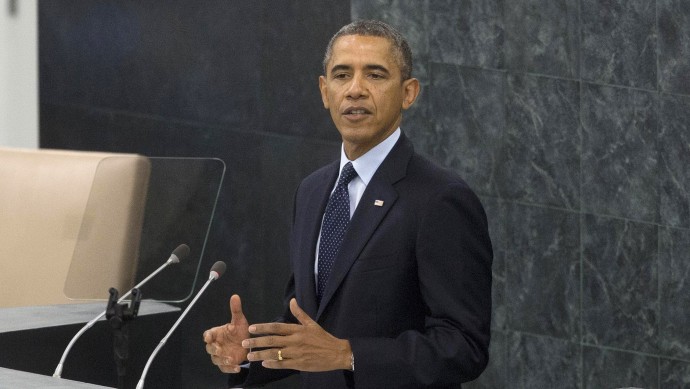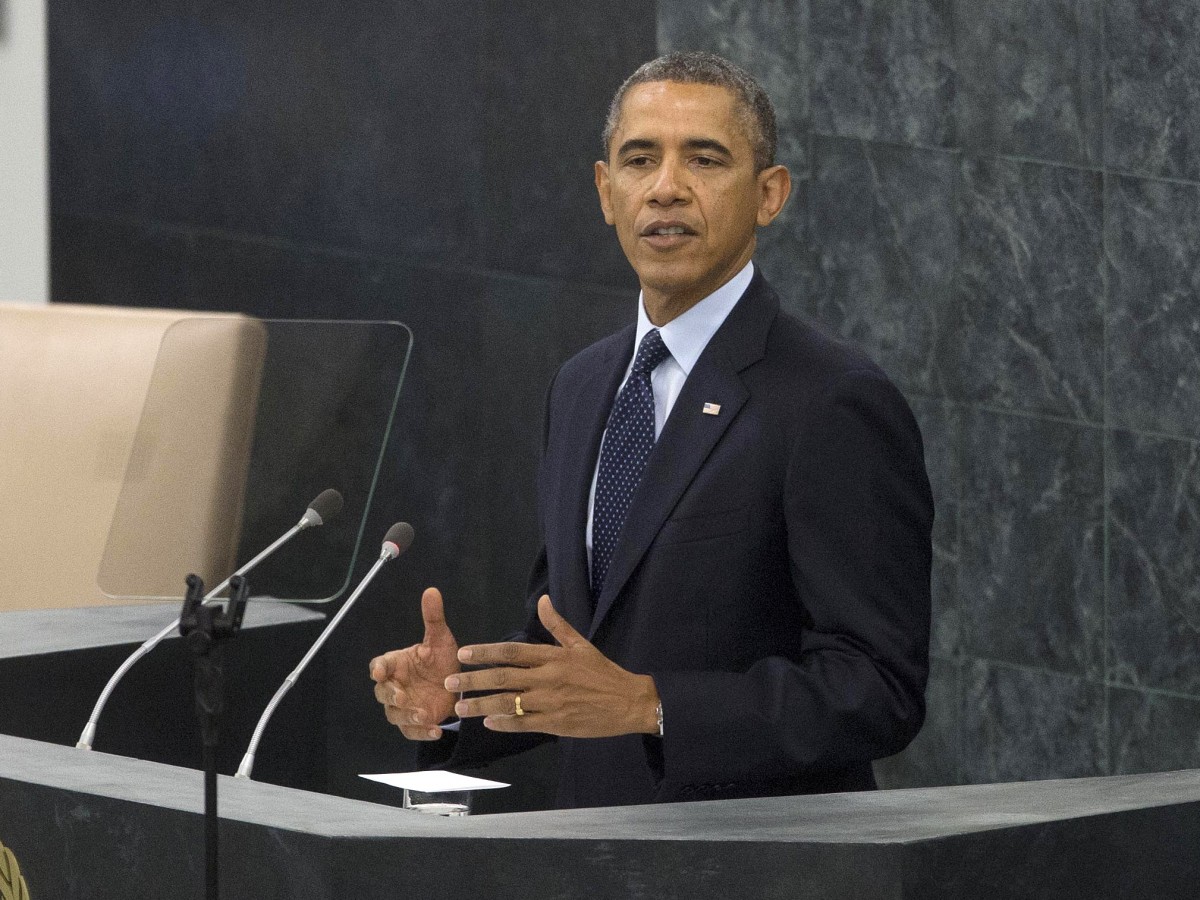
In the last couple of weeks, political activities in Tehran and Washington have suggested that a radical shift in Middle Eastern policy — a thawing of American-Iranian relations — was in the works. Last week, Iranian President Hassan Rouhani indicated that nuclear weapons or weapons of mass destruction were never a part of his nation’s defense policy, and that he would be interested in restarting nuclear talks with the West if an easement of sanctions against Iran is a part of that discussion.
“In its nuclear program, this government enters with full power and has complete authority,” Rouhani told NBC News’ Ann Curry in his first interview with an American news outlet since taking office. “The problem won’t be from our side. We have sufficient political latitude to solve this problem.”
“We have never pursued or sought a nuclear bomb, and we are not going to do so,” he said. “We solely are looking for peaceful nuclear technology.”
The Tuesday addresses of Presidents Obama and Rouhani to the U.N. General Assembly were imagined to be a symbolic “burying of the hatchet” between the two nations. With a well-photographed handshake between the two leaders, the United States’ foreign policy in the Middle East, which in part centered around Iranian containment against any potential strike on Israel, would have made a full course correction. Symbolically, it could have been as iconic as the 1972 handshake between then-U.S. President Richard Nixon and then-Chairman of the Communist Party of China Mao Zedong, in which anti-communist Nixon’s reaching out to China started friendly talks with a nation the United States had frozen out diplomatically since 1949.
“In the near term, America’s diplomatic efforts will focus on two particular issues: Iran’s pursuit of nuclear weapons, and the Arab-Israeli conflict,” Obama told the General Assembly Tuesday. “While these issues are not the cause of all the region’s problems, they have been a major source of instability for far too long, and resolving them can help serve as a foundation for a broader peace.”
Obama continued:
“We are encouraged that President Rouhani received from the Iranian people a mandate to pursue a more moderate course. Given President Rouhani’s stated commitment to reach an agreement, I am directing John Kerry to pursue this effort with the Iranian government, in close coordination with the European Union, the United Kingdom, France, Germany, Russia and China. The roadblocks may prove to be too great, but I firmly believe the diplomatic path must be tested. For while the status quo will only deepen Iran’s isolation, Iran’s genuine commitment to go down a different path will be good for the region and the world, and will help the Iranian people meet their extraordinary potential – in commerce and culture; in science and education.”
The handshake between Rouhani and Obama never came to be, however. After “listening carefully” to what Obama had to say about America’s future role in the Middle East, Rouhani opted for caution in moving forward, opting not to meet with the American president at the U.N. In an interview Wednesday, Rouhani cited a lack of time to properly prepare for the meeting — referencing the diplomatic freeze after the Iranian Revolution and the resulting lack of practical experience in talking to American officials — as the reason for not meeting with Obama.
A cautious approach
“Iran seeks constructive engagement with other countries based on mutual respect and common interest, and within the same framework does not seek to increase tensions with the United State,” Rouhani told the General Assembly. “I listened carefully to the statement made by President Obama today at the General Assembly. Commensurate with the political will of the leadership in the United States and hoping that they will refrain from following the short-sighted interest of warmongering pressure groups, we can arrive at a framework to manage our differences. To this end, equal footing, mutual respect, and the recognized principles of international law should govern the interactions. Of course, we expect to hear a consistent voice from Washington.”
Rouhani’s hesitation toward embracing the United States is being seen in different ways from different viewpoints. Some see Rouhani as being cautious toward a United States who — through its unmanned aerial vehicle targeted killing program, its international electronic spying through the National Security Agency and its current calls for military intervention in Syria — appears to be overtly and dangerously aggressive in its current foreign policies.
“We are not the government of Syria,” he told Curry when asked about the chemical weapons handover. “We are one of the countries of this region which is asking for peace and stability and the elimination of all weapons of mass destruction in the entire region.“
“We consider war a weakness. Any government or administration that decides to wage a war, we consider a weakness,” Rouhani continued. “And any government that decides on peace, we look on it with respect to peace.”
Even though Rouhani acknowledged publicly President Obama has been friendly and positive with him, many in Rouhani’s administration do not agree. “Unfortunately, the U.S. administration is still adopting the language of threat while dealing with Iran,” said Marzieh Afkham, a spokeswoman for the Iranian foreign ministry, according to the New York Times. “We have announced that this needs to change into the language of respect.”
Iran feels that it has the right to seek out ways to enrich uranium for its power generation programs. The West sees this as a potential step in gaining the capability of making weapons-grade nuclear materials.
Changing the playing field
In direct contradiction to Russian President Vladimir Putin’s assertion that America is not exceptional, Obama argued that America is indeed exceptional due to the willingness of the nation to embrace issues outside its self-interest. With that mentality, Obama announced that for the remainder of his presidency, the United States’ main disposition toward the Middle East will consist of the confrontation of “external aggression against our allies and partners,” the free flow of energy from the region to the world — the first official acknowledgement in more than twenty years that America’s Middle East policy is tied to oil — the destruction of terrorist networks and the responding to the developing or use of weapons of mass destruction.
It was generally thought that an American-allied Iran would significantly change the political playing field in the Middle East. An Iran pushing for peace would isolate both Syria and Hezbollah, which could significantly shorten both the Syrian civil war and the Arab-Israeli conflict.
Some feel that despite being elected with more than 50 percent of the vote, Rouhani may not have the power needed to actually effect change in Iran. Many feel that without the backing of the Revolutionary Guards, Rouhani would have no effective weight to change Iranian policy.
“Historical experiences make it necessary for the diplomatic apparatus of our country to carefully and skeptically monitor the behavior of White House officials so that the righteous demands of our nation are recognized and respected by those who favor interaction,” a statement from Iran’s Islamic Revolutionary Guard Corps (IRGC) said. The Revolutionary Guard serves as the public representation of the Supreme Leader, Ayatollah Ali Khamenei, and is charged with protecting and preserving the Islamic faith and government in Iran.
Both Khamenei and Rouhani have called on the IRGC to remove itself from the political process. Even though the IRGC answers directly to the Supreme Leader, with an increasing presence in the parliament due to the election of Guard veterans, the Guards have taken an assertive hard-line stance in Iranian politics — directly opposed to the moderate stance Khamenei and Rouhani have struck.
“The IRGC is above and beyond political currents, not beside them or within them,” Rouhani said, according to the ISNA news agency. “The IRGC has a higher status, which is that of the whole nation.”
Israel and Iran
Israeli Prime Minister Benjamin Netanyahu decries Iran’s claims of having no nuclear weapons program. “It was a cynical speech full of hypocrisy,” Netanyahu said in a statement after Rouhani addressed the General Assembly. Netanyahu boycotted the address in protest of Rouhani’s appearance. “It had no practical suggestion to stop Iran’s military nuclear program and no commitment to fulfill U.N. Security Council decisions. That exactly is the Iranian plan, to talk and buy time in order to advance Iran’s capability to obtain nuclear weapons.”
Netanyahu said that he would welcome a diplomatic solution that dismantled Iran’s capability to produce nuclear arms, but Israel “will not be fooled by half-measures that merely provide a smokescreen for Iran’s continual pursuit of nuclear weapons and the world should not be fooled either.”
Israel’s current relationship with Iran was defined after the 1979 Iranian Revolution. Prior to this, Iran was Israel’s closest Islamic ally, with Iran being the second Middle Eastern nation to recognize Israel as a sovereign nation. Under Grand Ayatollah Ruhollah Khomeini, however, Iran grew to accept Israel as an expression of American foreign policy; Iran, prior to the 1979 revolution, was run by an American- and British-installed government. Iran withdrew its recognition of Israel, cut all ties to the nation and developed a pronounced anti-Zionist political stance in the aftermath of the revolution. Under President Mahmoud Ahmadinejad, the frozen relations between the nations became a cold war with Iranian support of Hezbollah and Hamas. Since 2010, the Mossad — Israel’s foreign intelligence service — and the Israeli Defense Forces have engaged the Revolutionary Guards in a number of bloody scrimmages.
The oil question
Despite the second-guessing and doubts, there is one irrefutable fact in play that will keep the Obama administration hopeful for Iranian reconciliation: Iran controls the third-largest proven oil reserves in the world. With current Iranian oil output the lowest it has been in twelve years — 2.6 million barrels a day compared to a peak production before sanctions of 4.39 million barrels per day in 2007 — Iran is losing $58 billion per year, per a conservative estimate from CNN.
“The potential is clearly there. Iran sits on 9.4% of proven global oil reserves, putting it in the top five worldwide. The outlook is more promising for natural gas, with 18% of global reserves, placing Iran number one, according to BP’s annual survey,” CNN reported.
A return of full oil production from Iran would herald cheap oil, dropping energy costs internationally. Major oil producers, such as Saudi Arabia — who is seeking to defend $100 per barrel — are not so happy about this prospect. “Nobody wants Iranian oil back on the market,” said Fereidun Fesharaki, chairman of FACTS Global Energy. “If they came in today, the immediate reaction is the Saudis either have to cut back production or the price of oil must fall. It’s not possible to just continue business as usual.”
Regardless of everything else, Rouhani is determined to play out the relaxation of hostilities with the United States on his terms, at his pace. “I agree with what I years ago called heroic flexibility, because this is sometimes a very good and necessary move but with sticking to a basic condition,” Rouhani was quoted as saying by the ISNA news agency in regard to dealing with expectations from the U.S. and the IRGC of ending the 33-year-long stalemate.
He said: “Sometimes a wrestler shows flexibility for technical reasons, but he doesn’t forget who his opponent is and what his real goal is.”


